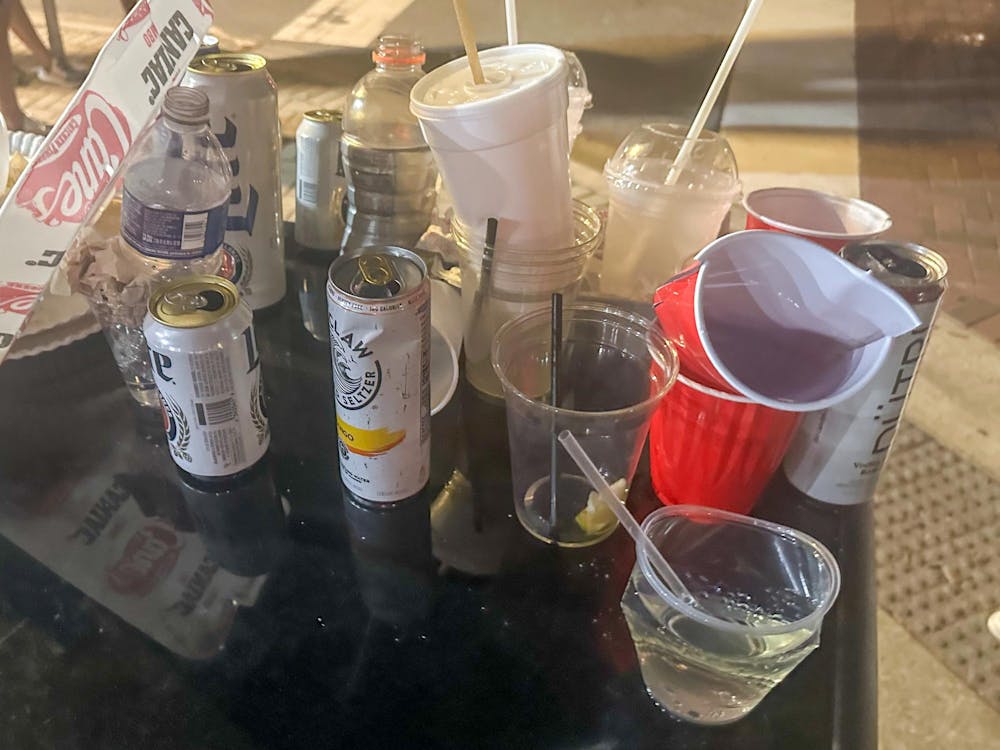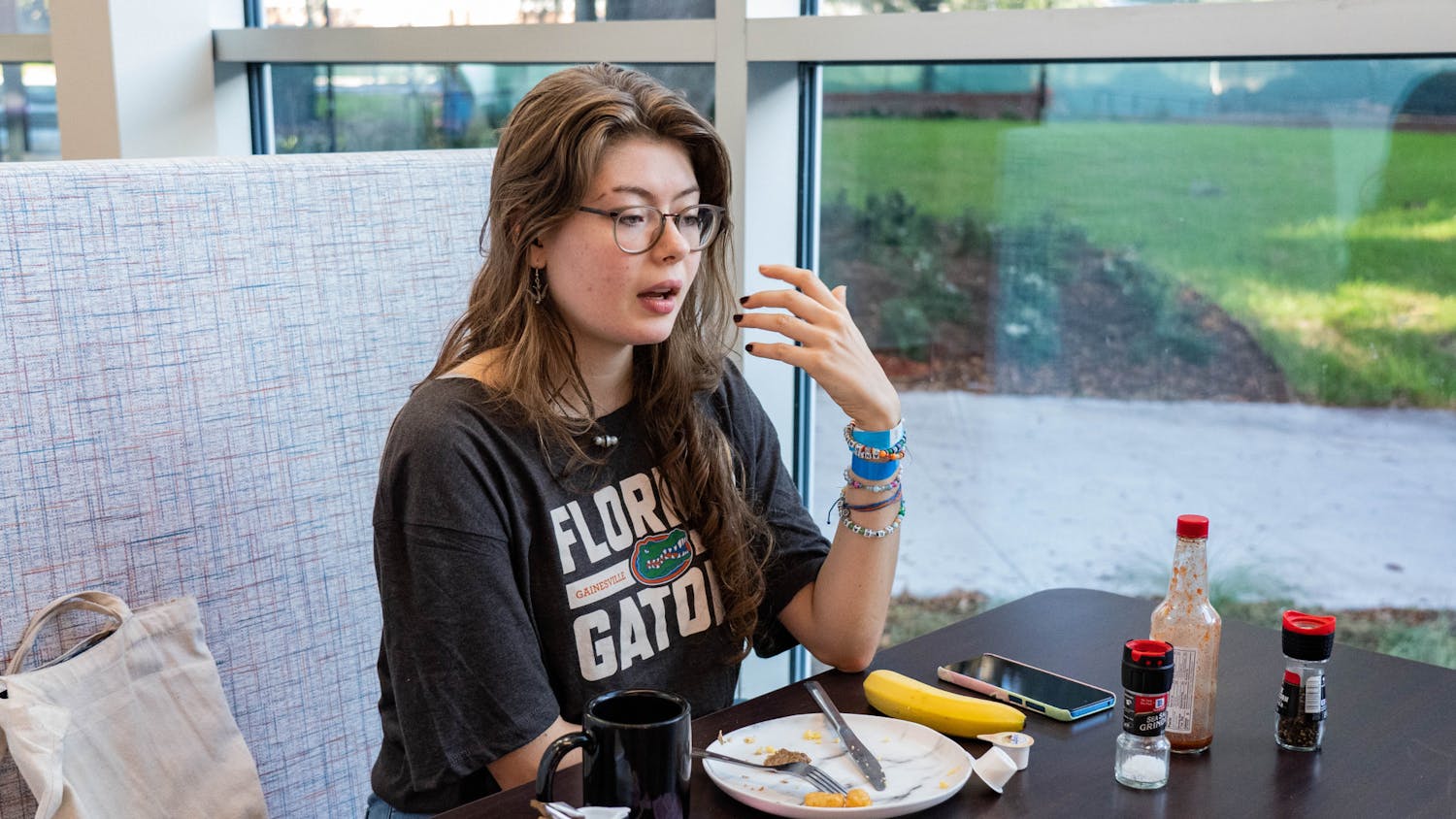Grabbing a handle of Tito’s vodka, one-third full, and chugging it straight at The Range bar. That’s the last thing Bennett remembers before waking up in the hospital with a wristband reading “rescue peanut.”
The UF student, whose last name is omitted due to regulations from his Alcoholics Anonymous chapter, had just started his second semester of college. He spent much of the first getting “way too messed up” on alcohol and marijuana, skipping class and getting into fights.
After a friend picked Bennett up from the hospital, he used their phone to call his dad.
“He was like, ‘OK, you’re done,’” Bennett said. “And that was the point where there was nothing left.”
Bennett’s father picked him up the next day to take him to a Connecticut treatment center.
Almost 70% of UF students reported drinking in the last three months in a health survey conducted in 2022, the latest data available. That’s about 6% higher than the nationwide reference group. Although it’s normalized as part of the college experience, drinking also comes with mental and physical risks.
Bennett, now a 20-year-old UF industrial systems sophomore, said his own substance misuse began in high school when he smoked marijuana daily. After he added alcohol in college, his parents grew concerned. But he was too “deep in the barrels” to see himself as an addict.
“In my head, throwing up and having to go to the hospital and making my parents pay, that’s OK,” Bennett said. “Watching my mom look at me when I literally can’t move, can’t walk, because I’m just throwing up.”
Today, Bennett has been sober for about a year and a half and helps direct communications for his AA chapter. He still sometimes visits bars with friends.
“I think what I was really afraid of, going into rehab, was that I would change as a person,” he said. “I thought I was going to turn into a rock. But at the end of the day, I’m still me. I have different priorities now, but I’m still a funny kid, I’m still outgoing.”
Mental and physical risks
Emily Westerholm, a Gainesville Community Counseling mental health clinician, specializes in substance misuse disorders. Binge drinking is normalized among college students, even though their age makes them more susceptible to harmful effects, she said.
For a typical adult, binge drinking means consuming five or more drinks for males or four for females in two hours, according to the National Institute on Alcohol Abuse and Alcoholism.
Young adults can get overwhelmed with academic and social stress, Westerholm said. Many don’t know alcohol can worsen anxiety and depression.
“If you find yourself creating these new patterns where you’re only using depressants, and you don’t really know what you’re doing because you haven’t had that exposure before, it’s really overwhelming for your body,” she said. “Physically, psychologically.”
Even casual alcohol users can be affected. Mina Edwards, a 21-year-old UF sociology senior, drank about once every two weeks from age 18 to 20. Edwards became sober for health reasons about eight months ago and “just feels better” since giving it up, she said.
“I feel like I just have more mental clarity and better focus,” Edwards said. “I deal with a good bit of anxiety and depression and stuff, and I just noticed all of that was reduced a little bit when I stopped drinking.”
Additionally, drinking poses physical risks. Trevor Henderson, a UF Police Department lieutenant, said his biggest concern for students is alcohol poisoning — a life-threatening condition where there is so much alcohol in a person’s bloodstream their breathing and heart rate begin to shut down.
UF police responded to 130 on-campus alcohol-related incidents in 2023, 60% of which resulted in the sick person being transported via emergency medical services, according to figures the department provided to The Alligator.
The 130 alcohol cases in 2023 marked a jump from 75 reported the year prior and 89 the year before that. Henderson said the increase could reflect more incidents getting reported, which he sees as a positive trend.
In the past four years, UF police have not made any disorderly alcohol arrests. Rather, students get referred to the dean’s office or Student Conduct & Conflict Resolution.
“It’s not about punishment,” Henderson said. “It’s about getting them educated, getting them safety, any help before things could progress to worse.”
Alcohol, gender and sexual assault
Alcohol use is also considered a risk factor for sexual assault, said Liana Hone, a UF health education assistant professor. The inability to give consent while intoxicated sometimes furthered by drink-spiking drugs like Rohypnol or “roofies,” can endanger students, especially women.
Hone, who studies the link between alcohol and the desire for sexual partners, found an association between male sex with new partners, which has been linked with sexual aggression, and drinking in studies on more than 1,000 first-year students.
“In this age group, when mate choice and competition is kind of peaking, drinking is also peaking,” Hone said. “I don’t think that’s a coincidence.”
Hone said college students, especially women, can take protective steps while drinking to stay safe. Those include location sharing, setting intentions before starting to drink and downloading a ridesharing app.
The idea that men drink more than women, especially on college campuses, doesn’t hold up today, for college women have outpaced men in alcohol consumption every year since 2013 in the National College Health Survey. At UF, more men reported drinking in 2020, but the roles flipped by 2022.
Hone said reasons for the closing gender gap need further investigation but could relate to anxiety and depression among women, who were more than twice as likely to report being diagnosed with both conditions in the UF survey.
Shaylyn Lyons, an 18-year-old UF graphic design freshman and self-described “mom friend” of her group, said her gender identity plays a big part in her insistence on safe drinking habits.
“I was talking to one of my friends about going to the University Club, and she was going to go by herself, and I was like, ‘What are you doing?’” Lyons said. “‘Make sure you’re watching your drink, even if it’s not alcoholic, all of that.’”
David Fields, the executive director of the UF Health Florida Recovery Center, said men, especially white men, tend to be overrepresented in substance use treatment. However, he said he’s seen demographics grow to reflect greater racial and ethnic diversity, and he predicts gender may soon follow.
“Not that anybody sees it this way, but coming to treatment is a privilege,” Fields said. “You get a chance to take time out of your life to really delve into deep parts of who you are as a person, to become a healthier version of yourself. That's a real luxury.”
Outside the rehabilitation center Fields oversees, which treats some UF students but also draws adults from across the country, the university offers resources through its Counseling and Wellness Center to support students in substance use recovery.
Fields said he’s seen the university take some steps toward becoming more recovery-friendly in the last couple of years, such as hosting “sober tailgates” before each home football game in front of the UF Reitz Union. However, Fields would like to see more resources from the university, like a sober dorm option.
The Alcohol and Other Drugs Department of the UF Counseling and Wellness Center hosts the sober tailgates and weekly counseling groups. Coordinator Stefanie Jasper Romie encouraged students to seek support if drinking is impacting their health, academics or relationships.
“The best advice I would give is that you are not alone,” Romie said.
UF students concerned about alcohol use can reach out to the following on- and off-campus resources:
- North Central Florida Alcoholics Anonymous
- Contact: gainesville.intergroup@gmail.com
- Website: https://aagainesville.org/
- 24-hour hotline: 352-372-8091
- UF Counseling and Wellness Center Alcohol and Other Drugs Services
- Contact: 352-392-1575
- Website: https://counseling.ufl.edu/services/aod/
- UF Health Florida Recovery Center
- Contact: 352-265-4372
- Website: https://ufhealth.org/locations/uf-health-florida-recovery-center
Contact Zoey Thomas at zthomas@alligator.org. Follow her on X @zoeythomas39.
Zoey Thomas is a media production junior and The Alligator's Spring 2025 data editor. She previously reported for the metro, university and enterprise desks. In her free time, you can find her reading, crocheting or arguing for the superiority of sweet potatoes over regular potatoes.






